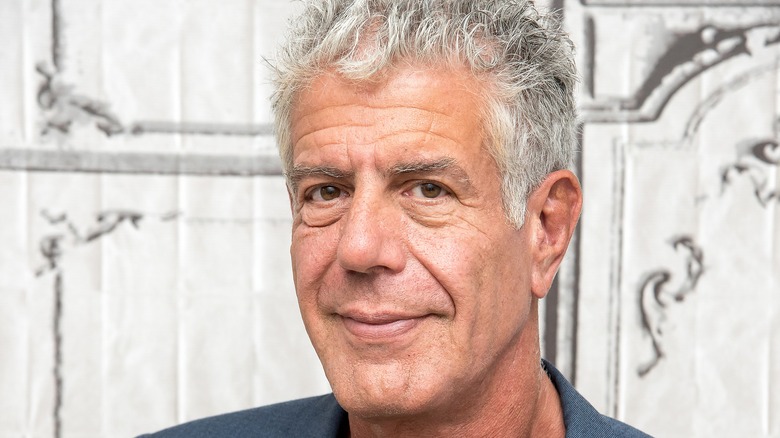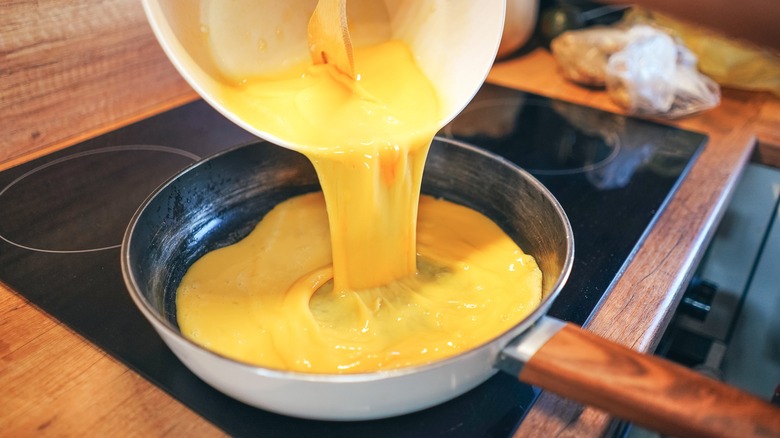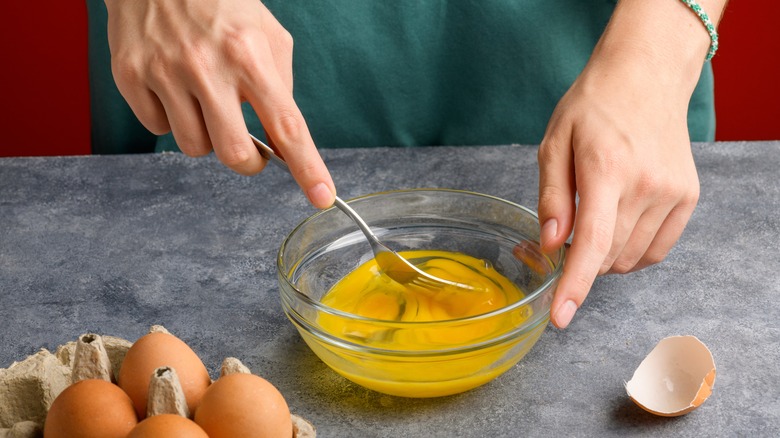The One Ingredient Anthony Bourdain Never Added To His Scrambled Eggs
If you habitually add a splash of milk or cream to your scrambled eggs because someone at some point somewhere told you that will make them fluffier, not so fast — the late, great Anthony Bourdain begged to differ with this common practice (via YouTube). It's believed that a hint of dairy will lend to a creamier, lighter, and fluffier egg texture, but this may be just an old wives' tale passed on for generations like a game of telephone.
Adding milk or cream to your eggs may have the opposite effect of what's intended — the extra moisture will end up actually drying out your eggs. The milk or cream will also probably water down the flavor as well as thin the consistency, making it easier to overcook or burn them.
The result? Tough, flavorless, overcooked scrambled eggs. What's more, added milk or cream means added protein to the already protein-rich egg mixture. Protein notoriously toughens as it cooks — think of a chewy overcooked chicken breast. Safe to say Bourdain knew best.
How to make Anthony Bourdain-style scrambled eggs
There is no one correct method for making scrambled eggs, but Anthony Bourdain had a precise process that he followed as his favorite. What else did he refuse to add to his scrambled eggs? Water. Likely for the same reason he didn't add milk or cream. Bourdain believed the egg is the star of a show, and the best way to highlight it is to stick to simple (via YouTube).
Starting with fresh eggs and a hot pan, he would crack them on a flat surface and drop them into a small cup or another container to check for shell fragments. Using a fork, he would gently beat the eggs, being careful not to overwork them. He liked to see strands of white and yellow in his mixture instead of one overall golden hue. He would then add some salt and pepper and immediately drop the scrambled mixture into the preheated pan with plenty of hot foaming butter in place.
Instead of whisking away, Bourdain would let the mixture sit for a bit to set and then use a figure-eight pattern to maneuver it around the pan as it cooked. He liked to maintain a larger egg mass instead of forming a bunch of small cooked egg pieces. The result? Perfectly fluffy scrambled eggs packed full of flavor.
Other egg-making myths
Adding liquid for a fluffier scramble isn't the only probable old wives' tale when it comes to eggs. There are a couple of other myths that deserve a good debunking. You may have heard the more you whip eggs — regardless of whether it's for a scramble, omelet, or frittata — the fluffier the result will be. While it seems intuitive that more air in the egg mixture would make it lighter, the more you whisk the less fluffy the eggs will be. For this reason, refrain from overbeating if fluffy is your goal, and use a fork instead of a whisk to mitigate the incorporation of air. Gordon Ramsey infamously refuses to whisk his scrambles.
When to salt eggs is another commonly contested topic. Many chefs firmly believe salting an egg mixture too far in advance is a culinary sin. Their argument being that the prolonged salt exposure will toughen up the eggs. However, it turns out that when the salt is added has a negligible effect on the texture and end result of the scrambled eggs. Bottom line? Salt away whenever you remember to — forgetting to season your eggs altogether may be a much larger sin.
Another common misconception is that you cannot (or should not) make scrambled eggs in a microwave — this is patently false. While the texture of nuked scrambled eggs will not be the same as those made in a pan, it's a solid option for when you're in a rush or don't feel like scrubbing dishes.



